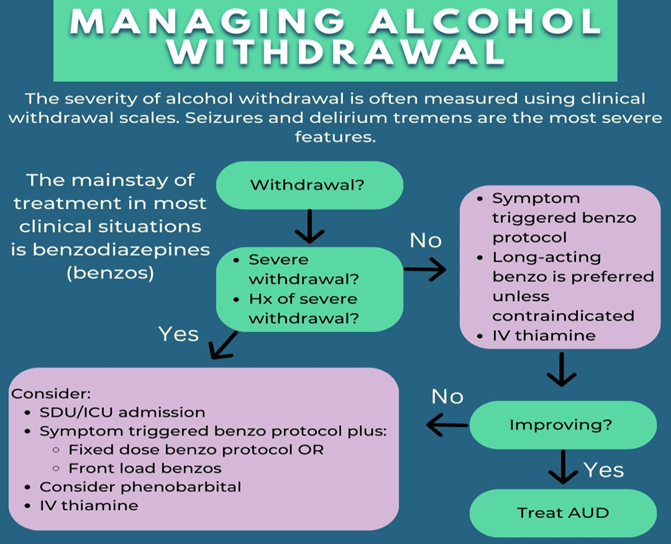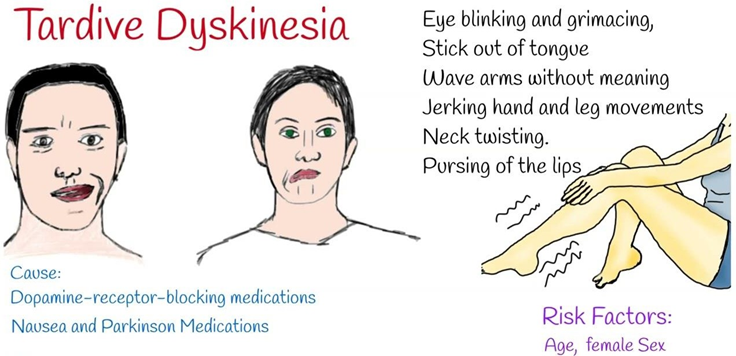A nurse is reinforcing teaching for a client who has generalized anxiety disorder and has been prescribed alprazolam. Which of the following instructions should the nurse give the client?
"Stop taking alprazolam right away if you experience abdominal discomfort."
"Watch for drowsiness and light-headedness while taking alprazolam."
"Drinking alcohol decreases the effectiveness of alprazolam."
"This medication has a low risk for physical dependence."
The Correct Answer is B
A. Abruptly stopping alprazolam can lead to withdrawal symptoms, and abdominal discomfort alone may not necessarily indicate a need for immediate cessation of the medication.
B. Alprazolam is a benzodiazepine with sedative properties, so drowsiness and light- headedness are common side effects. Patients should be cautious when engaging in activities requiring alertness, such as driving, while taking alprazolam.
C. Alcohol should be avoided while taking alprazolam due to the potential for increased sedation and central nervous system depression. However, it does not directly affect the effectiveness of the medication.
D. Alprazolam, like other benzodiazepines, has a high potential for physical dependence, and abrupt discontinuation can lead to withdrawal symptoms. Patients should be informed about the risk of dependence and the need for gradual tapering if discontinuation becomes necessary.
Nursing Test Bank
Naxlex Comprehensive Predictor Exams
Related Questions
Correct Answer is D
Explanation
A. Methadone is an opioid agonist primarily used for the management of opioid dependence and chronic pain. It is not indicated for the treatment of alcohol withdrawal or delirium.
B. Acamprosate is a medication used to support abstinence in individuals who have recently stopped drinking alcohol. It is not typically used to manage acute alcohol withdrawal symptoms such as delirium tremens.
C. Disulfiram is a medication used as an aversive therapy to deter alcohol consumption by causing unpleasant reactions (e.g., flushing, nausea, vomiting) when alcohol is ingested. It is not indicated for the treatment of alcohol withdrawal or delirium.
D. Lorazepam is a benzodiazepine commonly used to manage alcohol withdrawal symptoms, including delirium tremens. It acts by enhancing the inhibitory effects of gamma- aminobutyric acid (GABA) in the central nervous system, thereby reducing the symptoms of alcohol withdrawal such as seizures.

Correct Answer is D
Explanation
A. Akathisia refers to a subjective feeling of restlessness and an objective inability to sit still.
It's characterized by a need to move constantly and is not typically associated with choreiform movements, lip smacking, or spastic facial distortions.
B. Dystonia involves sustained or intermittent muscle contractions leading to abnormal postures or twisting movements. It typically presents with muscle spasms, not choreiform movements or lip smacking.
C. Pseudoparkinsonism refers to a collection of symptoms that resemble Parkinson's disease, such as tremor, bradykinesia, rigidity, and postural instability. It does not typically involve choreiform movements or lip smacking.
D. Tardive dyskinesia is a movement disorder characterized by involuntary, repetitive movements of the face and body, including choreiform movements (rapid, jerky movements), lip smacking, and spastic facial distortions. It often develops after long-term use of antipsychotic medications like chlorpromazine and can persist even after discontinuation of the medication.

Whether you are a student looking to ace your exams or a practicing nurse seeking to enhance your expertise , our nursing education contents will empower you with the confidence and competence to make a difference in the lives of patients and become a respected leader in the healthcare field.
Visit Naxlex, invest in your future and unlock endless possibilities with our unparalleled nursing education contents today
Report Wrong Answer on the Current Question
Do you disagree with the answer? If yes, what is your expected answer? Explain.
Kindly be descriptive with the issue you are facing.
